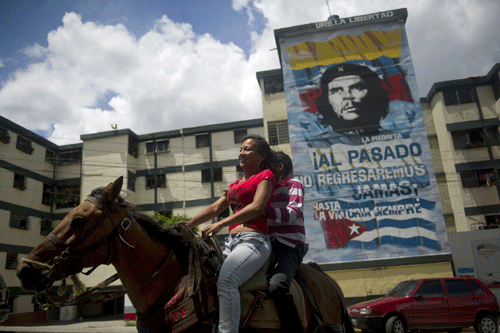Venezuelans go to polls in Chavez's toughest election
 People ride past a mural depicting Argentine revolutionary Ernesto “Che” Guevara in Caracas, on Saturday. Venezuelan President Hugo Chavez is vying for a fourth term in office that would extend his presidency by another six years.[EITAN ABRAMOVICH / AGENCE FRANCE-PRESSE] |
President faces major challenge from business-friendly Capriles
Venezuelans voted on Sunday in the toughest election President Hugo Chavez has faced in almost 14 years in power after fresh-faced rival Henrique Capriles electrified the country's opposition.
Chavez, 58, retains a loyal following among the country's poor, who have propelled him to easy victories in past elections, but 40-year-old Capriles has narrowed the gap in opinion polls after an energetic door-to-door national campaign.
Weakened by a bout with cancer, the president stepped up his previous campaign efforts, even dancing in the rain at a Caracas rally on Thursday as he pleaded for another six-year term.
Chavez, a fierce US critic, is a highly polarizing figure who survived a coup in 2002 and became popular with the long-neglected poor for using the country's vast oil wealth to fund health and education programs.
Mentored by Cuba's Fidel Castro, Chavez has become the leading voice of Latin America's left, railing against the US "empire" while befriending Iran and Syria. He also has used petro-dollars and cut-rate oil deals to build a network of diplomatic allies around the region.
Facing his biggest election challenge, Chavez has admitted making mistakes, vowing to "become a better president" if returned to office.
The business-friendly Capriles has criticized Chavez over the country's regular power outages, food shortages and runaway murder rate, which has risen to 50 homicides per 100,000 inhabitants.
The telegenic former Miranda state governor has vowed to unite the country, accusing Chavez of being "sick with power" and dividing the nation.
Capriles, who describes himself as David fighting Goliath, was picked by the opposition in an unprecedented primary election in February.
Chavez held a 10-point lead in the latest opinion poll, but Capriles has attracted huge crowds at rallies while other surveys have put them in a statistical dead heat.
Around 19 million voters are called to the polls. Some 140,000 troops have been deployed to prevent violence while alcohol sales are banned until Monday.
Election experts say the electronic voting system is fraud-proof, though Chavez charges that the "far right" plans to not recognize his victory if he wins.
While the opposition is better organized than in the past, Chavez counts on a well-oiled campaign operation, with supporters waking up voters with bugles.
If Chavez wins, he will have a free hand to dominate Venezuela for six more years on top of the 14 years he has already been in office, letting him push for an even bigger state role in the economy and cement his legacy.
If Capriles wins, it will likely mean an abrupt shift in foreign policy, an eventual loosening of state economic controls and an increase in private investment - though a tense transition would likely follow until the inauguration in January.
Some Venezuelans were nervous about what might happen if disputes erupted over the election.
"Nobody trusts the other people, especially when it's their political rivals," said Maria Villareal, a teacher and Capriles supporter who stocked up on groceries on Saturday.
She and other critics of the president say Chavez has inflamed divisions by labeling his opponents "fascists", "Yankees" and "neo-Nazis".
During Chavez's final rally on Thursday in Caracas, he shouted to the crowd: "We are going to give the bourgeoisie a beating!"
David Hernandez, a Chavez supporter, agreed the mood was tense, but he blamed the opposition.
"Chavez is going to win and Capriles will have to accept his defeat," Hernandez said, standing next to his parked motorcycle on a downtown street. "If Capriles doesn't accept his defeat, there could be problems."
Violence flared sporadically during the campaign, including shootings and rock throwing during rallies and political caravans. Two Capriles supporters were shot dead in the western state of Barinas last weekend.
Chavez, who has said he emerged successfully from long treatment for cancer, held an impromptu news conference on Saturday night, and when asked about the possibility of disputes over the vote, he said he expected both sides to accept the result.
"It's a mature, democratic country where the institutions work, where we have one of the best electoral systems in the world," Chavez told reporters at the presidential palace.
But he also said he hoped no one would try to use the vote to play a "destabilizing game". If they do, he said, "we will be alert to neutralize them".
AFP-AP


















